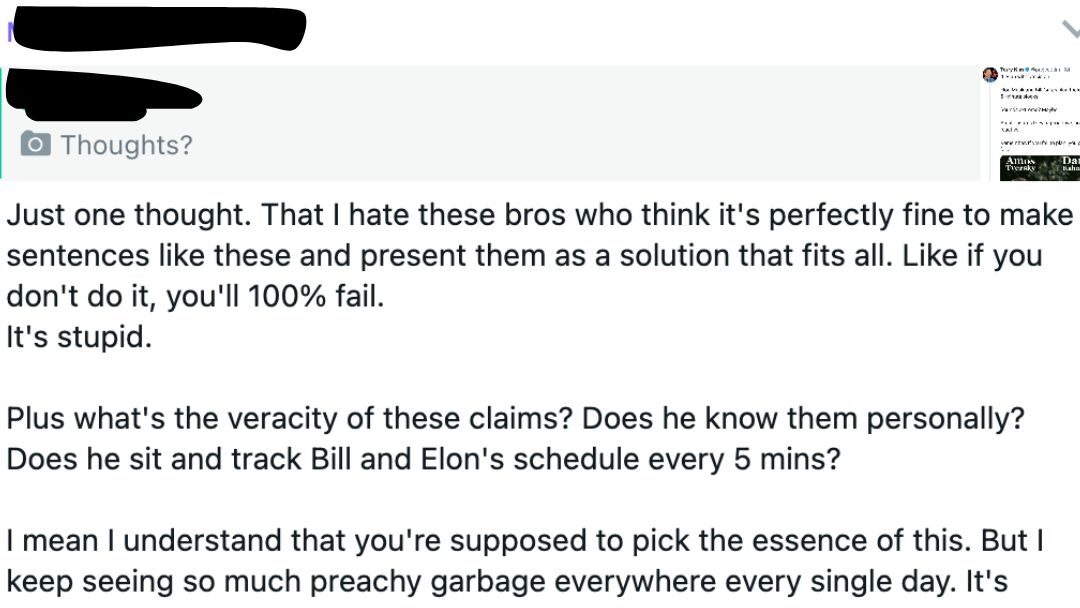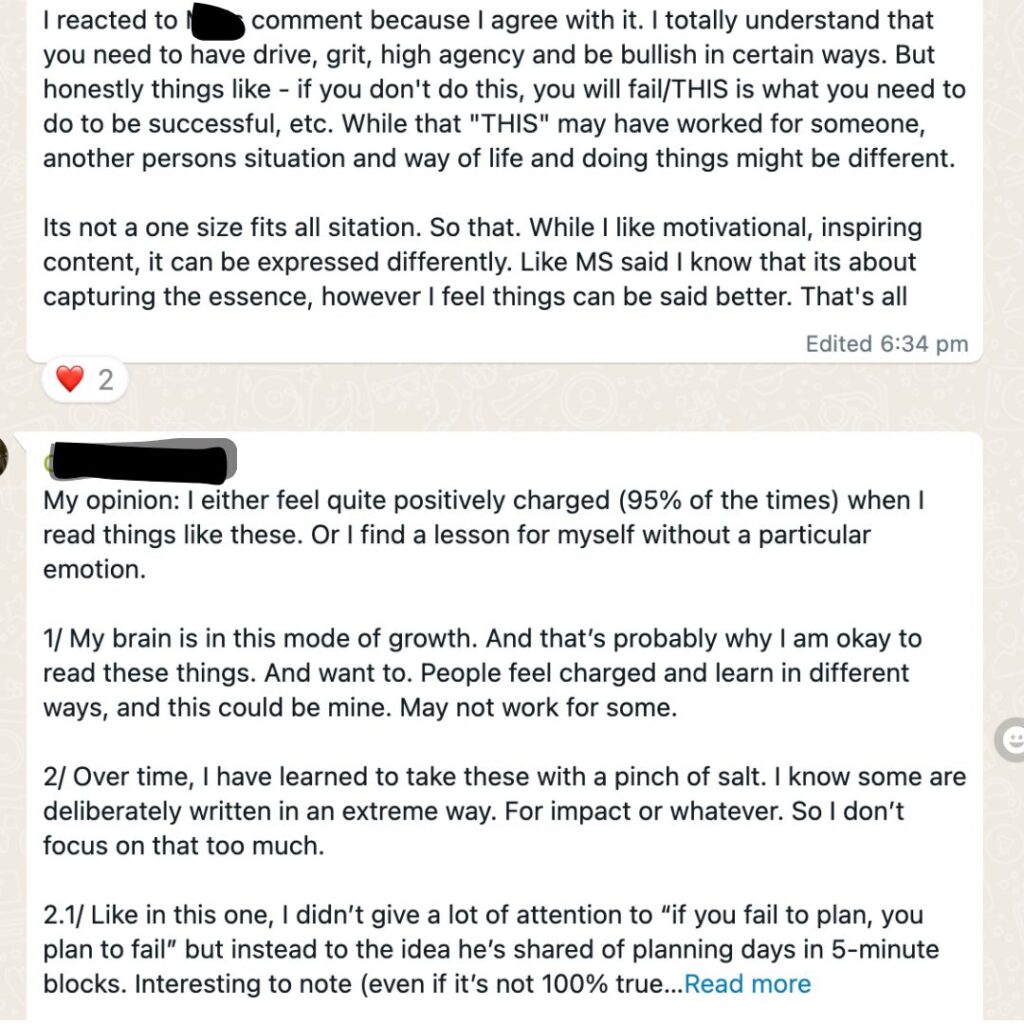The C4E Collective is a marketing communication agency, whose members index highly on keeping up with the latest essays, videos, thoughts leaders around the ideas, models, and frameworks of work-life, growth, designing your life, leadership lessons, business lessons, and more. I like to group most content discussed here, as Tech Bro Thoughts, or Tech Bro Links, because most of these leaders are rich white men in the USA, talking about how you should invest in health, invest in clearing out your first two hours to do focus work without distraction (as if a married brown working woman in India is going to be able to do that, with her duties of packing lunch, and getting the clothes in the machine, and what not). These are thoughts that only young, single, privileged people can really apply.
But I digress.
Saurabh, the co-captain of the C4E Collective, recently shared an X post, about how the likes of Elon Musk and Bill Gates plan their day in blocks of 5 minutes, indicating how they prioritise their time. The following conversation ensued on the chat.


***
How we receive anything we read/watch/listen/consume is very personal; depending on our insecurities, our context and circumstance, and perhaps even how we are placed in our professional lives. This discussion, which focused on what to take away from a particular teaching, really highlighted how we can learn to intuitively receive ideas in a way that fits our life. For instance, Chandni mentioned how she would simply use this thought to think deeper about prioritising her time and ignore the “if you don’t do this you will fail” tonality of these posts.
I think the Internet, turning into a place of advice and playbook sharing, is a dangerous thing no matter how healthily you receive it. Some of it has got to do with the quantum of these posts, some with the competing nature of advice we receive, some with of course, human behaviour itself.
(I talk about work culture in this post, but it might be applicable to every advice we see. Benefits of reading a book. Fitness tips. Nutrition lists.)
***
My Apple Screen Time analytics tell me I spend about 8 hours a week on WhatsApp, 12 hours on Instagram. I know I spend about 3 hours a week on LinkedIn and X, and maybe another hour on Reddit, Discord and Minor Digital Reading Spaces.
Because algorithms work the way they do, I come across some piece of content about how to design your life better.
The first obvious problem is that all this consumption is passive. If I read about dividing my day in 5 minute blocks of time, I typically like a post, save it even, share it on my stories. My brain interprets this action as ‘complete’. I don’t actually do anything about mindful time management, I am just deceived into doing it.
Say I really like this idea. In which case, I add this to my daily planning and routine. I go through the struggles of adapting to a new idea, a new system. Only to log in to my social media and boom. Find a completely different idea about focus work, chunking, dedicated maker hours, and more.
***
Adapting to changing systems is difficult, and should only be done at long intervals. Having systems only works when they are on auto-pilot mode. Every action it takes towards accomplishing a new task, is an added layer of friction, one that will become an obstacle in adapting it.
When I began to work out two years ago, I would often sleep in my workout clothes, the mat, napkin and water bottle, along with the choice of home workout video already for when I wakeup. It put me in a position of action – because everything that would otherwise delay me, I had already cleared out.
Play Books and suggestions on routines are great, but the point is, that only YOU can analyse what works for you, and built it up to accommodate more efficient ways of working from there.
The second is the intervening time of distraction.
Say you are setting up a new system. It will take a few days, even a few weeks, for you to really know if it’s working, for you to tweak and modify it to suit your work and life. Before that, it’s glitchy, it makes you want to give up every single day. If in this phase, you find a new shiny toy, one that a sexy influencer is writing with an even sexier hook, promising you that THIS is the only system that works, it’s not unlikely for you to then follow that trail. What are the chances you will actually stick to that one?
***
There is no right way to use social media, and the overwhelming case of distractions it comes with. But I have, ironically, found works for me.
I examine my work, life, the real problems, and first define them. When I started to act on maker manager hours, I realised that while building P3, and being a part of C4E, I was pushed into meeting many people, doing many calls, but then had no time to take action on those without interruption. I needed the maker manager hours, or any solution that allowed me to juggle being both strategist and executor on a project. I did not get up one day to read the essay, and then told myself, yes, this would be a good thing to try out.
Then, I switch off completely from these articles – I did not have an opinion for weeks on the 70 hour work week and that was fine. I did not have to. I had to put my head down and continue the work I was doing, the hours I was actually putting in. I did not read anything on note-taking till I had found my system, and the system became comfortable enough to be in a fight against the shiny new toy. Switch on, switch off. That’s the way I have navigated the Internet of Advice.
We waste more time wanting to try out new things, or rather, new packages of the same thing, than in making something work, and having the patience till we know it’s working.
And that, surely goes against every rule of productivity and the power of consistency that tech bros in the USA are espousing?